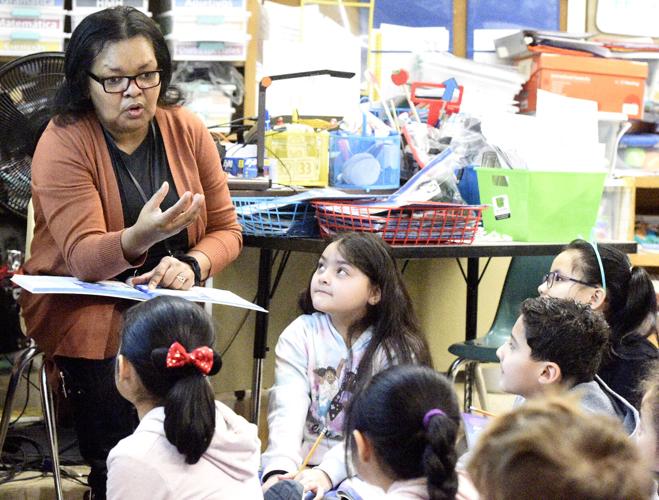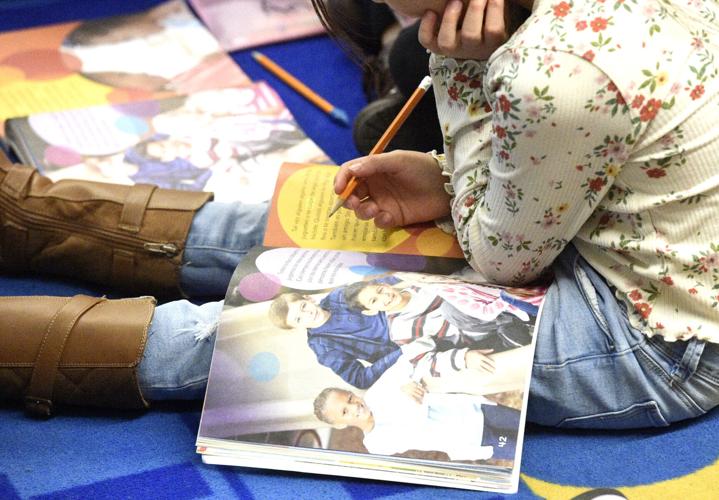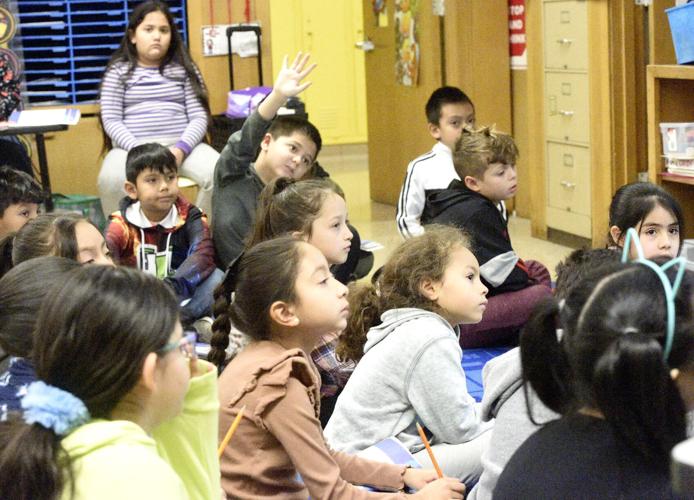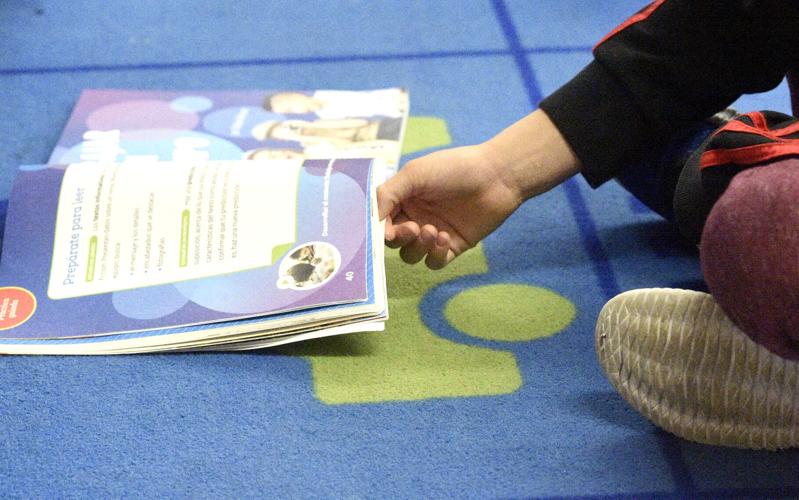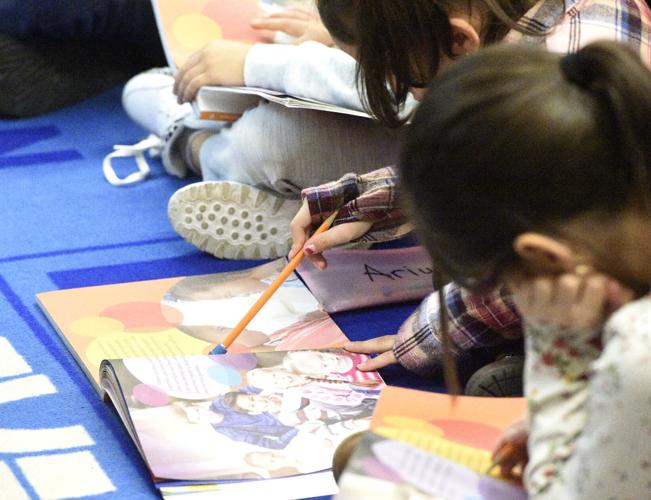RACINE — Early literacy is a key indicator of a child’s educational future. According to a 2012 study, students who are not reading proficiently by the end of third grade are four times more likely to not graduate high school than proficient readers.
The Racine Unified School District has made a concerted effort to address early literacy since returning to in-person schooling in March 2021. RUSD has a district-level plan to improve early literacy, mainly by helping students in kindergarten through second grade.
“It was very clear the need is at K-2 for the kids coming in, especially after COVID,” said Kat Hoffman, S.C. Johnson Elementary principal.

Second grade teacher Rosa Inostrosa instructs students during a dual language reading lesson Thursday at S.C. Johnson Elementary.
In 2027, RUSD aims to have 75% of pre-K through third grade students meet internal reading proficiency benchmarks.
People are also reading…
“Our goal is to have all students perform at a level that does not require intense intervention by the time they reach third grade,” according to RUSD’s 2027 strategic plan.
The current percentage of students who are reading proficiently is unclear, since RUSD students did not take those internal tests last school year. In terms of external benchmarks, in the 2021-22 school year, 54.1% of RUSD students were below basic in English language arts, according to data from the state Department of Public Instruction. RUSD had 28% of students with English language arts scores in the basic category, 15.7% in the proficient category and 2.2% in the advanced category.
Prior to COVID-19, RUSD was starting to implement a district-wide early literacy strategy, but that was disrupted by the pandemic. Now the plan is in place, and educators are working to make it a reality.
Hoffman said early literacy has always been important to RUSD. Until recently, though, the plan “was a little bit more disjointed,” she said. “Now it’s so intentional, and everybody in the district understands that this is a focus for the district. This is a core piece … The feel is very different, as far as this united sense that we have right now.”
The district’s plan involves implementing a curriculum that RUSD began using in the 2021-22 school year that focuses on the “science of reading,” which emphasizes rules and learning letters and sounds.
“All of those little, intricate things is really what science of reading switches and focuses on,” said Janell Decker, RUSD deputy chief academic officer. “You’re not necessarily going to understand the depth of English just by reading. There needs to be direct instruction on why words are the way they are, why syllables work the way they work.”
Teachers in preschool through second grade received training on the science of reading last summer, and the multi-day training will occur this summer for third- through fifth-grade teachers.
“We have a direction and we have a goal, and the journey is a lot more clear now for us,” Decker said.

A second grade student reads a workbook during a dual language lesson in January 2023 at S.C. Johnson Elementary. No dual language program changes are set to occur in the 2024-25 school year, but there will almost certainly be adjustments in 2025-26 because of enrollment, staffing and financial challenges.
All hands on deck
To try to meet that 2027 goal, the school district has allocated its resources to have more instructors working on early literacy.
At S.C. Johnson Elementary, 2420 Kentucky St., that means working with young students in a variety of ways. Kristie Cushman is the S.C. Johnson K-2 literacy coach who assists teachers and works with varying group sizes of students. Cushman and Hoffman talk regularly about literacy updates and ways to improve. Cushman also reminds teachers of the new curriculum and explains why reading lessons are taught how they are.
S.C. Johnson has three Title I reading teachers — including one dual language instructor — who work with students requiring the most assistance. The Title 1 educators assist K-5 students but focus on K-2 interventions. Reading Corps volunteers also work one-on-one daily with students.
The district’s early literacy plan also stresses collaboration. This school year, elementary school principals have done monthly walk-throughs in other buildings to observe colleagues. Hoffman has incorporated ideas from other schools, including how to set up classrooms for reading lessons, and she hopes the “really valuable” walk-throughs continue.
Monthly student literacy progress is tracked and reviewed by educators to determine what is and isn’t working. Decker also meets every month with elementary school principals to discuss progress.
“We want to really hear from people and see it with our own eyes: ‘How is this going? What can we learn from this all-hands-on-deck approach?’” Decker said.

Second grade students participate in a dual language reading lesson Thursday at S.C. Johnson Elementary.
Pandemic impacts
Broadly speaking, students learn to read from kindergarten through second grade and then read to learn starting in third grade. That is why the emphasis is on helping K-2 students develop reading and writing foundations so they can learn more easily in future grades.
“You need the reading to do everything else,” Hoffman said. “If we can get our kids ready right now, that struggle is not there when you get to the upper grades.”
However, Decker said that line of demarcation is less clear because of a year of virtual learning caused by the pandemic, which caused reading gaps for more students.
Remote learning made it tougher for younger students to learn the basics of reading and writing. For example, teachers could not guide students’ hands on how to correctly write letters during virtual instruction. Upon returning to in-person schooling, face masks also made reading lessons more difficult because students could not see instructors’ mouths to help them pronounce a letter.

A second grade student holds a workbook during a dual language reading lesson in January 2023 at S.C. Johnson Elementary. The Racine Unified School District is projecting a deficit of just over $2.5 million for the upcoming school year, and it is facing severe budget challenges starting in the 2024-25 school year.
Importance of attendance
Student attendance was negatively impacted by the pandemic as well. Decker said attendance is not up to its pre-pandemic levels but has improved this school year compared to last school year.
Attendance is vital to improve reading, since improvements cannot occur if students are absent.
“If they aren’t here, they will struggle,” Decker said.
According to the National Center on Education and the Economy, which worked with Racine Unified to measure the connection between attendance and reading proficiency, “absenteeism was a contributing factor to limited improvement.”
For kindergarten, RUSD students at Level C are considered to be reading at grade level. Levels AA, A and B are considered below grade level. Levels D and E are considered above grade level.
According to NCEE data from the 2021-22 school year, RUSD kindergarten students in level AA missed an average of 34.1 days of school, kindergarteners in level A missed an average of 24.5 days and kindergarteners in level B missed an average of 22 days. Students in level C missed an average of 19.4 days, students in level D missed an average of 17.5 days and students in level E missed an average of 17.2 days.

Second grade students participate in a dual language reading lesson in January 2023 at S.C. Johnson Elementary. To balance its budget, RUSD cut 192 full-time equivalent staff positions and decreased department budgets by 5% in 2024-25, among other actions.
‘Seeing impacts’
Racine Unified’s early literacy goal is clearer, but that doesn’t mean it will be met. Educators said two of the main challenges to having 75% of students reading proficiently are attendance and the social and emotional impact of the pandemic on students’ ability to learn.
There appear to be signs of progress, though. S.C. Johnson instructors worried about second-graders’ reading levels this school year because most of their kindergarten year occurred remotely. However, Cushman said the school’s first grade teachers did a great job reviewing skills that students didn’t master in kindergarten because of the pandemic.
Hoffman said she is encouraged by that example and similar efforts to address early literacy, and believes the school and school district are headed in the right direction.
“We are seeing impacts,” Hoffman said. “It’s going to take time. It’s not going to be perfect … but we are seeing that huge growth.”
Scientists have decoded why we love chocolates so much.
















